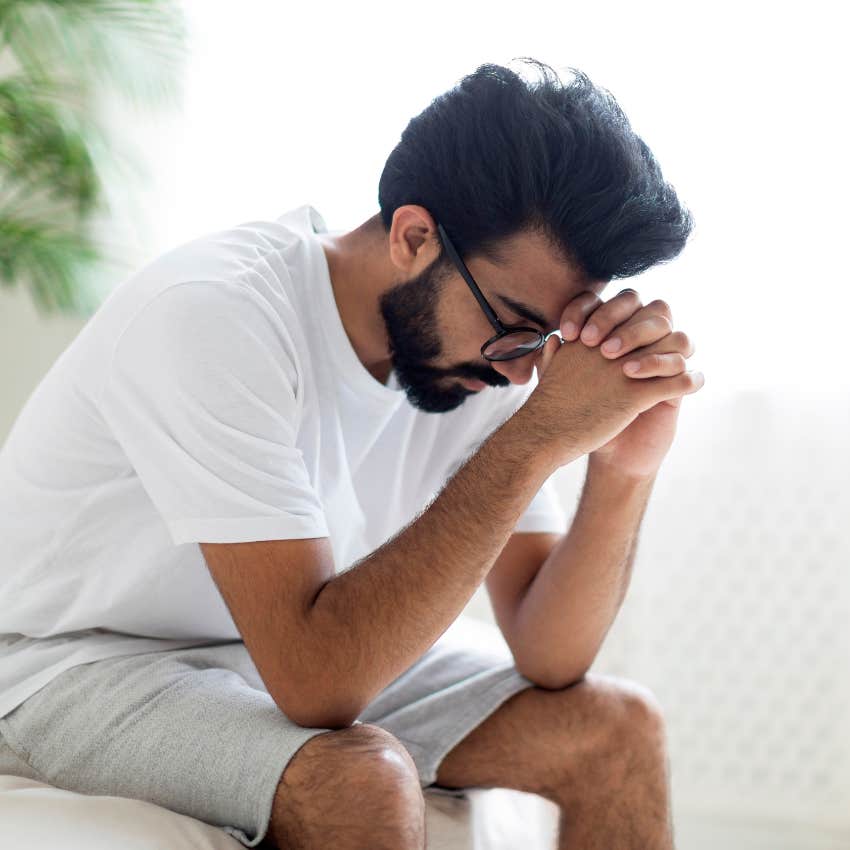The Toxic Side Of Always Being The Strong One, According To 4 Experts
It's okay to ask for help sometimes.
 Ruben Valenzuela | Unsplash
Ruben Valenzuela | Unsplash Social constructs of strength put a lot of pressure on people to constantly perform at their highest degree of ability, even when they might be under the influence of extreme emotional stressors. These outmoded social constructs of strength can lead to a perception of vulnerability as weakness and, therefore, undesirable.
Fortunately, we are seeing positive changes in how an individual's strength can be defined. These new definitions are being combined with a deeper social awareness of the importance of emotional intelligence for personal and community health.
How we define strength and how we accept emotional vulnerability has been improving, a study from The American Psychological Association (APA) has revealed. Yet, there are still many people who feel pressure to never show any perceivable weakness, so we asked our experts for some insight into why a person would feel the need to always be strong.
The toxic side of always being the strong one, according to four experts:
1. You feel that showing emotion is 'weak'
A big, toxic red flag to watch for is excessive apologies around showing sadness and toxic beliefs about tears and crying. If you hear statements like "crying is weak" or "men don't cry", you need to challenge these statements that are echoes of past parents and coaches.
It shows great strength to be vulnerable, to share true feelings, and to shed tears. By falling apart, we can put ourselves back together again, stronger than we were before.
— Cyndera Quackenbush, Author/Educator
2. You are afraid to be vulnerable because 'that's the way I was raised'
 fizkes / Shutterstock
fizkes / Shutterstock
Some people were never allowed to cry or complain while growing up, and some were even mocked when they did cry. Many parents didn't allow their children to have a voice, so the kids lived in their heads and didn't reveal their inner thoughts or feelings.
These same children built an adult persona of being a falsely defined "alpha" in life, and they ended up hiding any perceived weaknesses from the world.
— Dr. Gloria Brame, Therapist
3. You don't value self-care as you should
Always feeling the need to be strong for others and always jumping in to fix other people's problems naturally results in a lack of self-care. There is never time for yourself, so your health is affected.
The lack of self-care, combined with the continued self-sacrifice, develops into feeling frustrated, overwhelmed, and exhausted from always helping others instead of being honest that you are overloaded and overwhelmed.
Brene Brown shows how being vulnerable is having the courage to say, "I am unable to participate at this time because this is what is happening in my life." Try being strong for yourself instead of trying to be strong for others.
— Mona Cooley, Family Coach Specialist
4. You have an unhealthy fear of rejection
 Prostock-studio / Shutterstock
Prostock-studio / Shutterstock
Another toxic reason for being strong is due to both familial and societal messages that weakness is not acceptable. In addition, vulnerability and the need to be helped, though inherently human, have been labeled as weak.
Any perceived weakness quickly develops into a fear of judgment that if you don't have it all together, you must be weak, and therefore, something is wrong with you. If something is wrong with you, you might be rejected or abandoned.
These negative messages and stigmas do so much damage and contribute to high levels of anxiety and depression. The need to always "be strong" leads to feelings of isolation and loneliness, which is ironically a very weak place to be.
— Lesley Goth, Psychologist
So there we have it. The need to always be strong is not only unrealistic inhuman, it eventually leads to a place where the always-strong person is left isolated and alone, most likely in a state of ill physical and emotional health. Not a very strong image, is it?
Instead of forcing yourself to always be the strong one who can carry the weight of the world on your shoulders, recognize your humanity, let yourself be vulnerable, let yourself be helped instead of always being the helper, practice some self-care, and realize, it is okay to be weak sometimes. No one can be 100% all the time.
Will Curtis is YourTango's expert editor. Will has over 14 years of experience as an editor covering relationships, spirituality, and human interest topics.

